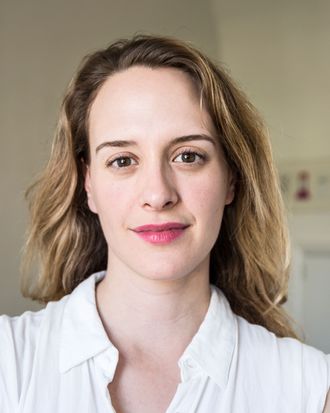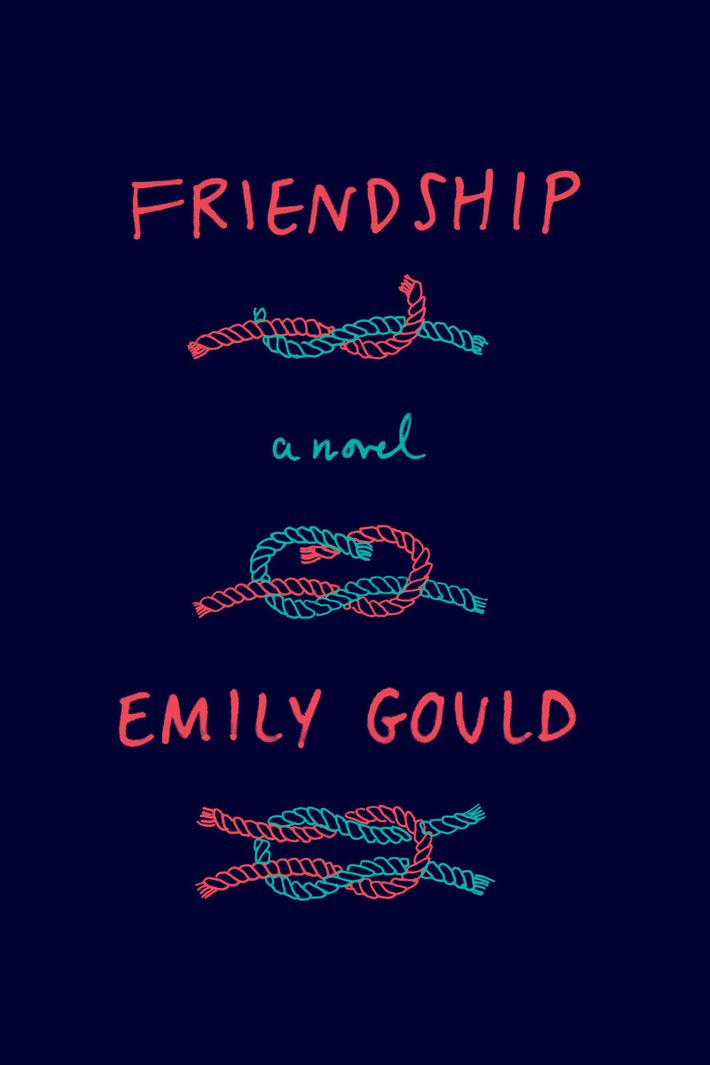
Emily Gould had lost her cat when we spoke by phone. In the weeks before the launch of her second book and debut novel, Friendship, Gould also lost her job, was the subject of two controversial profiles, provoked rage in the women of Girls, and inspired a male book blogger to spill 11,000 words ranting against “middling millennials,” the “largely white women” writers who “confuse the act of literary engagement with coquettish pom-pom flogging.” By the time the furor reached its peak — which included a live-tweeted literary suicide intervention — Gould had already decamped to fiancé Keith Gessen’s father’s house on Cape Cod, where her rescue cat, Swizzle, has a tendency to wander.
Meanwhile, discussion of Gould’s book — which follows the sometimes-uneasy relationship between two broke female writers, one of whom is impregnated during a one-night stand — is only beginning. In the calm between two PR storms, she talked to the Cut about books, Brooklyn, bad reputations, and the “devastatingly mean email” that a Lena Dunham friend sent.
You’ve had a kind of crazy week, and the book isn’t out until Tuesday!
A crazy couple of weeks. I wish the stuff with the profiles and book coverage was my No. 1 problem, but actually I also just lost my job? [Laughs.] So that’s been the main focus of my, you know, everything. Whereas this book stuff — I didn’t even read the Ed Champion thing. [Editor’s note: The 11,000-word post inspired “the great literary subtweet war of 2014.”] Keith read it and told me I wasn’t allowed to read it, and I was like, Okay, cool, I won’t read it ever. But yeah, that stuff seems so much less important and real right now. It’s actually been kind of a blessing, I’m, like, “hashtag blessed” to have something that so obviously matters concretely to focus on.
This is the job the New York Times profile talked about, at 29th Street Publishing?
Yeah. I got — I guess I should say laid off — on Friday, so by the time that article was published, it was no longer true. Once it happened, I realized I had no reason to be in New York until the first reading, so I was like, “Rent a car. Go to Cape Cod. And bring the cat,” who is actually missing right now. Maybe he’s outside killing chipmunks or something. I just adopted him, and he’s kind of a hellcat. He doesn’t go outside in New York, but I think he figured out a way to do it here. I’m trying not to freak out about it. He disappeared for a few hours yesterday but came back.
What happened with the job?
They’re pivoting from being a publishing company to being more of a software platform, and a software platform doesn’t need an editorial director. I knew the company was moving in a different direction, but I’ve never been fired before. I’m more of the person who quits. [Laughs.] I’m trying to see it as progress in my life.
Are you looking for a new job?
I have no idea what the fuck I’m doing right now. I’m really excited — this sounds like a very spun answer — but I’m actually totally, genuinely, really excited to focus on Emily Books. It kind of sucked not to be able to fully, 100 percent focus on it this year, because I think we could be moving faster. We plan to start publishing original books, probably by winter 2015. There are a couple books that we’re in the process of acquiring, and we plan to do them in print as well as e-books by partnering with a publisher whom we’ve been in talks with for a while.
It’s scary how retrogressive a lot of traditional publishing is. I mean, just the idea that FSG wouldn’t allow me to sell my own book via Emily Books because they don’t allow books to be sold without DRM.

How autobiographical is Friendship?
Very little of it is autobiographical. I mean, there are definitely places and restaurants and things in it that I’ve been to, but I don’t know whether I would call that autobiographical. That’s just the stuff you take from life — it would have been a real stretch for me to set a book in Beirut.
So when people say that your foil is Amy, the character who “stood up for her right to be mean on the Internet” by quitting a gossip-blogging job, or that Bev is your Emily Books co-founder Ruth Curry, that’s not the case?
It’s just more complicated than that. Bev definitely has some of Ruth’s background, in terms of her midwestern, evangelical upbringing. Amy looks like me, and I gave her a job that is similar to one I had. The people at that job are made up, but the location of the job, in Dumbo, and also its ridiculous name, Yidster, is something like Jewcy, where I worked for a glorious three months right after I quit Gawker. But now I’m trying to think about what else is autobiographical in the book, because clearly none of that shit happened. Neither Ruth nor I has ever been pregnant. Sally is completely made up. And even though Amy looks like me and does some things that I have done, she’s not me. She’s more like some aspects of me that I’m trying to exorcise.
Elle presented you as being Lena Dunham before the world was ready for her, whereas the Times said you “paved the way for Girls,” thereby triggering a Twitter rant from Girls showrunner Jenni Konner. Do you think either comparison is accurate?
I don’t know if it’s for me to say. Chronologically, my work came first. But I can’t say if it had an influence. Judging from Jenni Konner’s and Lena Dunham’s responses, I think they really chafed at the implication. That didn’t feel great to me. I’m really into making sure the people I felt were antecedents to my work get a lot of credit and shout-outs. That’s what Emily Books is about. So that shocked me, and it wasn’t a response I was expecting from someone whose work I admire. I’ve always been a fan.
That media trope of pitting women against each other when their work has any superficial similarities is not a cool thing to play into if you can avoid it. Why am I not being compared to men? Why am I not being compared to my fiancé, who wrote a book about completely similar characters, at a completely similar time of their lives, in a completely similar milieu? Femaleness is not incidental to my book, but I also don’t think that everyone who is female and writes about their life is in some way Lena Dunham–esque.
But it was in your mind a little bit, wasn’t it? You brought her up in both interviews.
I’m sure it seemed like that. When my first book came out, everybody compared me to Sloane Crosley, and I thought that was stupid, too.
Why —
Sorry, can you just hang on for a minute? [Voices in background.] We found the cat! He was taking a nap in one of the upstairs closets.
Oh, good! Although that’s far less dramatic than what I was envisioning, terrorizing the countryside with his razor-sharp claws.
We keep thinking that, and then the other day he turned out to be behind the trash bin. They have one of those ones that slides out, and he was behind it. He seemed very sad and stinky when he came out.
Maybe the cat has an unfairly bad reputation. Everyone thinks he’s a bad seed, but he just wants to take naps.
He’s a serial napper. He can’t be stopped. Anyway, you were saying something?
You seem to have this tendency, when living your life or talking about it, to turn into a lightning rod. People are quite literally going insane. Why is that?
If I knew, I think I would try to figure out a way to stop doing it. Because I actually don’t love it, and it’s reassuring to know that about myself. The day the Elle profile came out, I got a really devastatingly mean email from someone who’s friendly with Lena Dunham. I was like an hour late for work because I was lying in my bed, crying hysterically. Keith came in and found me and was like, “What’s wrong?” And I was like, “I don’t want any of this to be happening.” And he was like, “It’s too late; you wrote a book.” And I was like, “I wish I hadn’t. I wish I could make it stop.” And then I took half an Ativan, washed my face, ate a gluten-free vegan muffin from the bakery on the corner of the block where everyone now knows that I live, and went to work.
When I thought about it later, I realized it’s good to know that I’m not the kind of person who feels great when something like this is going on. Those people are actually sociopaths, those who love being provocative. I’m grateful when people write to me and have something nice to say, but I what I found out about this type of attention in my first go-around is that none of it feels good. Money feels good, and the freedom and time that money can buy feel good. But attention doesn’t teach you anything about yourself.
This strikes me as unfortunate, because you’re someone people like paying attention to.
I know! [Laughs.] It sucks. I do feel a kind of responsibility not to step back from it, which sounds absurd, but I feel like if I stopped I’d be letting the bad guys win. And though I don’t love attention, I do love being social on the internet. I think a lot of what is sometimes described as exhibitionistic is … this sounds so corny — but I do like sharing stuff. And I like people sharing stuff with me. Anyone who follows me on Twitter knows I like everything. And I like everyone’s Instagram photos. And I like commenting on everyone’s Instagram photos. I don’t know why. I just like it.

